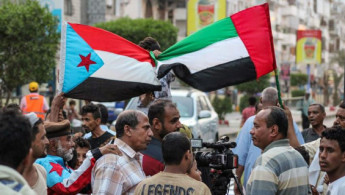Major southern authorities reject UAE-backed separatists 'self-governance' declaration
The Southern Transitional Council (STC) accused the government of failing to perform its duties and of "conspiring" against the southern cause, and said self-governance had begun at midnight.
The government condemned the move and said the separatists - who have long agitated for independence in the south - would be responsible for the "catastrophic and dangerous" outcome.
The breakdown between the one-time allies comes as a Saudi-led coalition, which backs the internationally recognised government in a battle against the Houthi rebels, has extended a unilateral ceasefire aimed at fending off the coronavirus pandemic - a move rejected by the Houthis.
Read also: PM appeals for assistance after 'disastrous' Aden flooding
Yemen's separatists signed a power-sharing deal in Riyadh last November that quelled a battle - dubbed a "civil war within a civil war" - for the south that had in August seen them seize control of the second city of Aden.
The Riyadh pact quickly became defunct, failing to meet deadlines for key measures including the formation of a new cabinet with equal representation for southerners, and the reorganisation of military forces.
Twitter Post
|
The STC announced in its statement that it was declaring "self-governance in the south starting midnight on Saturday April 25th, 2020.
"A self governing committee will start its work according to a list of tasks assigned by the council's presidency," it said.
Aden residents reported heavy deployments of STC forces in the city and a separatist source told AFP they had set up checkpoints "at all government facilities, including the central bank and port of Aden".
Military vehicles drove through the city with STC flags flying aloft.
The political landscape in the south is complex, and despite the STC's declaration some southern cities, including Socotra, Al-Mahrah and Hadramout, said they did not recognise the call to self-rule and would remain aligned with the central government.
Yemen's Foreign Minister Mohammad al-Hadhrami said the STC move was "a continuation of the armed rebellion last August and a declaration of rejection" of the Riyadh agreement.
Deep divisions
More than 100,000 have been killed since the Saudi-led coalition intervened five years ago to back the internationally-recognised government of Abedrabbo Mansour Hadi against the rebels.
The STC’s announcement came after at least 21 people were killed in flash flooding this month, with Aden's streets submerged and homes destroyed.
Read also: Saudi Arabia's faltering divide and rule strategy in Yemen
Hundreds of angry protesters took to the streets of Aden after electricity was cut in the city for four consecutive days due to the flooding.
On Friday evening and the early hours of Saturday morning, the protesters cut off several roads in the city and burned tires in the street.
They also tried to set fire to government buildings, burning one of the main doors of a building belonging to the government's statistics office in the Tawahi area.
In an attempt to placate the protesters, the government announced on Saturday that electricity would gradually return to Aden.
It said on Twitter that the Haswa power station had returned to service and that this would reduce the number of hours that the city would be without electricity.
Twitter Post
|
Aden has suffered from a lack of essential services for a long time.
The southern separatists claim that the Yemeni government is imposing collective punishment on the population of Aden by neglecting public services.
The STC's statement on Sunday said there had been a marked deterioration of public services, which "was clearly reflected in the latest torrential rains that caused the people in Aden deep suffering".
The government was using its powers as "a weapon to bring the southerners to kneel," it said.
Temperatures are extremely high in the city in summer and for many years, the government has failed to provide a constant supply of electricity.
The renewed operation of the Haswa plant will only provide electricity for three hours every seven hours.
The UAE, like the STC, has a zero tolerance policy towards the Muslim Brotherhood and Yemen's Brotherhood-influenced Al-Islah party, which has representatives in the internationally recognised government.
Last August, deadly clashes broke out between the government and STC forces who seized control of Aden, ousting unionist forces who had set up base there when President Hadi fled the Houthi-held capital Sanaa in February 2015.
The tussle for control of the south exposed divisions between the coalition partners - Saudi Arabia, which backs the government, and the United Arab Emirates, a backer and funder of the STC.
The Riyadh agreement had been welcomed as preventing the complete break-up of Yemen, and hailed as a possible stepping stone towards ending the wider conflict in Yemen.
But the cracks soon emerged, with complaints over food shortages in the south, a sharp depreciation of the currency, and a lack of funds to pay public sector employees.
While the government and the STC are technically allies in the long war against the Houthis, the secessionists believe the south should be an independent state - as it was before unification in 1990.
Agencies contributed to this report.
Follow us on Facebook, Twitter and Instagram to stay connected





 Follow the Middle East's top stories in English at The New Arab on Google News
Follow the Middle East's top stories in English at The New Arab on Google News


